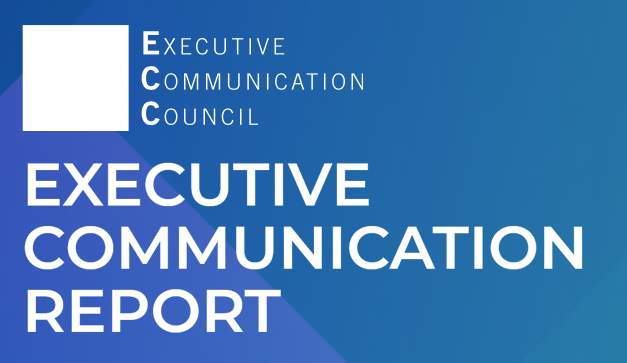CEOs Say the Darnedest Things
September 11, 2025
Exec comms pros give their bosses talking points of things to say in fireside chats or long podcasts. They should give them lists of things not to say, too.
CEOs used to love to say their companies were like families and employees were their most valuable asset. Until they started laying the family members off and dumping their most valuable assets over the side.
For awhile, CEOs were all quoting Alexis deTocqueville, on “the boldness of enterprise.” But everyone was doing it and so it stopped seeming bold at all.
Then, they all started saying, “The only constant is change.” Until the only constant became CEOs saying, “The only constant is change.”
What are they talking about now? Employees’ attitudes. And what kinds of attitudes do all CEOs want employees to have? Positive attitudes, exactly like their own!
Famously, among my family, friends and close colleagues, my first job upon moving to Chicago after college was in “marketing.”

I wrote an account in the Huffington Post about 15 years ago:
Dozens of interviewees and a five-minute interview during which it was ascertained that I had two eyes, a nose and a mouth. On the strength of those qualifications, I was told to report at 7:00 the next morning for an all-day “tryout” for the job.
The next morning I showed up in the only business attire I owned, an unfortunately chosen camel’s hair coat my dad had bought me on my last day in Ohio. It was already 75 or 80 degrees.
I was introduced to the young marketing executive who would serve as my guide for the day. Hector greeted me warmly and asked for my help in packing cargo from a small warehouse into the back of his blue Ford Escort. Pink and light blue stuffed bears on this side, boxes full of black genuine plastic folders with built-in calculators on that. As we drove toward the city he didn’t get into the secrets of marketing. He talked a lot about the power of positive thinking, the importance of never giving up, the need not to take no for an answer.
I thought of old Hector’s business philosophy this week, as I tried to keep a straight face reading a collection of CEO quotes, in Fortune:
Workday CEO Carl M. Eschenbach said, “I often say your altitude in life is completely determined by your attitude in life.” He added that, “The attitude that you bring to the office—and to your employees, your peers, and the people you serve alongside every day—is what ultimately will determine a lot of your success.”
Fortune also quoted Brooks Running CEO Dan Sheridan, who said on a podcast recently, “I just think as leaders, you have to be optimistic. You have to have a winning attitude. Otherwise, no one’s going to follow you.”
And the Fortune piece included the obligatory, oft-repeated quote from Amazon CEO Andy Jassy: “An embarrassing amount of how well you do, particularly in your twenties, has to do with attitude.”
What kind of attitude do these folks think most other corporate go-getters in their companies bring to work? More to the point, what kind of attitude do they think school teachers, church ministers, bartenders, nurses, jackhammer operators, social workers and stuffed-animal salesmen adopt, in order to haul themselves out of bed and go like hell for 10 hours a day, five days a week, for a paint-layer percentage of what high-altitude CEOs are pulling in?
Eschenbach had the audacity to go one further than my marketing mentor Hector, and ascribe his success to his selflessness: “Once I transitioned from a life of success for myself to a life of significance for others, everything changed. I think that is a key component to leading in this new world that we’re living in today … By serving others, somehow success will follow you—probably even more success than if you focused on success itself.”
As my daughter would say: Literally OMG.
Speaking of Hector, he drove us to a gritty street on what side of Chicago I didn’t even know, and:
Without ceremony, Hector opened the hatch and handed me an armful of stuffed bears and a box of the plastic folders. He took some bears and folders for himself and we headed into the first storefront we found open.
Barbershops, shoe stores, florists, taverns, gas stations, greasy spoons—proprietors, customers, mail carriers happening along—Hector tried first to sell them a bear, and if they weren’t interested, he offered a folder. But often—amazingly often, I thought—they were interested. And many of them were interested in each of the disparate items. Three bears for my grandchildren—two pink and one blue—and a folder for my nephew. (Can I interest you in a unicycle?)
The early-morning boozers bought bears out of guilt, the frustrated young bowling-alley operator fed his ambition a folder.
Hector did all the marketing, I humped the stuff and learned.
By 11 a.m. it was 90 degrees. I was melting in that camel’s hair jacket, and trying to figure out how I would break it to Hector that although I very much admired his positive attitude, I didn’t think I was cut out for this work. I was too negative a guy, I told him over a hot dog and fries.
He seemed to take it well at first, but after lunch he pointed at a Dunkin’ Donuts across the street from his car and coldly told me to wait there until he sold the rest of the carful. By now it had dawned on me that this was some kind of pyramid scheme, and that Hector had lost out on a commission by failing to inspire me to become a marketing executive like him.
And I was sorry I had let him down.
I’m sure Hector’s positive thinking propelled him to the captaincy of the stuffed-animal and business-folder industry.
Whereas, my relative negativity doomed me to the camel’s hair-clad squalor I live in to this day.
Look, I don’t blame CEOs for thinking such self-serving and economically narcissistic things. As my fund-raiser sister always told me, the first thing rich people spend their money on is ways to separate themselves from everybody else.
“Think like an owner!” an old boss used to say. “Think like an employee!” I used to silently reply.
But these folks do have normal people working for them, who are supposed to help them communicate with other normal people without sounding like Norman Vincent Peale 2.0.
Most corporate executives don’t like to read scripted speeches anymore. They like to work off talking points, and “speak from the heart”—the oldest gambit, of course, in the book.
Such people need balking points: things they like to talk about that never resonate with anybody. And one of those things is: People making millions telling people who make thousands what kind of attitude they ought to have.




